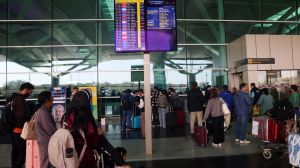US warning: Bilateral agri trade can be hit if India does not open market
The issue of market access for US agricultural products in India seems to have taken an ugly turn.
The issue of market access for US agricultural products in India seems to have taken an ugly turn with US Secretary of Agriculture Thomas Vilsack sending a strongly-worded letter to his Indian counterpart Sharad Pawar, stating that the bilateral agricultural relationship will be jeopardised if India does not change its approach.
Coming weeks after US President Barack Obamas visit,the tone of Vilsacks letter is learnt to have taken New Delhi by surprise. It is said to be particularly harsh on Indias stance against market access for US dairy products. In fact, sources described the tone of the letter as threatening to Indo-US agricultural trade.
India has raised the red flag on US dairy products,saying it may hurt Indian religious sentiments because the animal feed given to the cattle contains fortified meat products.
When contacted, US Ambassador to India Timothy Roemer struck a more conciliatory tone but did underline the need to make trade a two-way street that can be resolved to the satisfaction of Indian sentiments. The US and India enjoy a healthy and robust economic relationship. As President Obama noted during his recent visit,the growth of our economic partnership over the past decade is nothing short of historic. We look forward to continued cooperation and expansion of trade in all sectors,especially agriculture. Trade is a two-way street with mutual benefits and opportunities for both the consumers of America and India. We strongly believe that when India provides fair and open trade on agricultural issues,it can significantly help lower rising food prices and put more money into the pockets of the aam aadmi. At the same time,we will seek a resolution of this issue that fully respects the cultural and religious concerns and sensitivities of India citizens, said Roemer.
Notwithstanding US optimism,the tone of Vilsacks letter to Pawar has not gone down well with the Indian establishment. He is learnt to have made the point that if India does not show flexibility then it could jeopardise the bilateral agricultural relationship. He is also believed to have linked the access of Indian grapes,pomegranate and litchi to the US market to the access granted by India to US dairy products. The letter evoked much anger and Indian officials have taken up the matter with the US.
Access to American dairy products,particularly cheese,in India is learnt to be at the core of issue. Currently,Indian regulations stipulate that any country exporting dairy produce here must certify that the source was never fed feeds produced from internal organs,blood meal and tissues of ruminant origin. Indian authorities believe that
access to US dairy products might backfire in the backdrop of Indias religious and political sensitivities over this issue.
Enclosed with Vilsacks letter,sources said,is a study that there would be no remnant of the fortified animal feed if it is not given to the cattle for three months. The US had said it would ensure that the cattle for Indian markets is not given animal feed for a month. The indication is that US can increase this to three months to address Indian sensitivities.
Agriculture Ministry officials,however, maintained that India will stand its ground and was unlikely to offer US any specific relaxation. These officials argued that the same rule would be applicable to US as for products from other developed countries like Australia and New Zealand,which certify that their cattle have not been given animal feed.
In fact, agricultural market access failed to make the cut for the Indo-US joint statement issued at the conclusion of Obamas visit. This despite the fact that Vilsack held almost an hour-long closed-door meeting with Pawar to work out a paragraph for inclusion into the joint statement only a few hours before it was made public.
We held a discussion regarding the formulation of the joint statement, Pawar had told reporters after his meeting with Vilsack revealing,(US) President thinks that both countries should offer their farmers access to respective agricultural markets. It will be unfair for me to comment on the statement as it will be issued jointly by the two sides.
- 01
- 02
- 03
- 04
- 05































